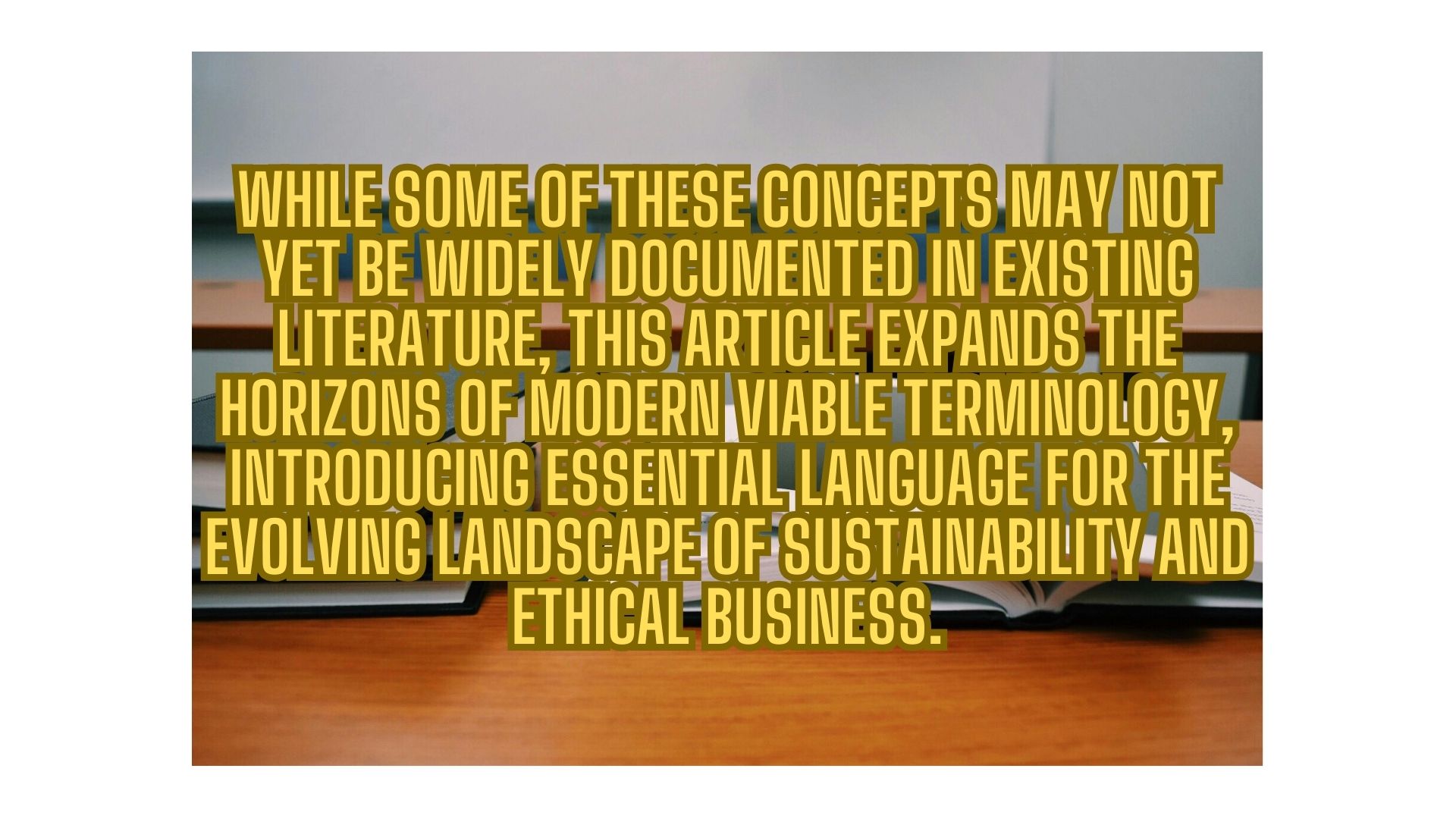The Hidden Power of Sustainable Language: Why Knowing These Terms Matters

In today’s rapidly evolving landscape of sustainability and ethical business, understanding key terms isn’t just a trend—it’s a necessity. Whether you’re an entrepreneur, investor, advocate for responsible commerce, or an activist, the language you use shapes the impact you create. Yet, as new frameworks and phrases emerge, many businesses struggle to keep up, risking irrelevance in a world that increasingly values accountability and environmental responsibility.
The terminology surrounding sustainability is more than just jargon; it’s a reflection of deeper shifts in how industries operate, measure success, and communicate their commitments. This guide breaks down the latest and most crucial terms that are redefining sustainable business and viable propositions.
The Rise of Regenerative Economy: Moving Beyond Sustainability
For years, businesses have focused on sustainability—reducing harm, minimizing waste, and lowering carbon footprints. But in a world facing severe ecological decline, minimizing harm is no longer enough. The Regenerative Economy takes things a step further. Companies embracing this model prioritize circular design, renewable resources, and strategies that leave a net-positive impact on the environment and communities. Instead of just sustaining, they restore and revitalize.
Example: Patagonia’s commitment to regenerative organic farming is a blueprint for businesses aiming to replenish ecosystems while creating high-quality products.
Planetary Boundaries: Business Within Limits
Developed by leading scientists, the Planetary Boundaries framework defines the environmental limits within which humanity can operate safely. Companies aligning with this model ensure their operations don’t exceed Earth’s ecological capacity, mitigating risks related to climate change, biodiversity loss, and resource depletion.
Why It Matters: Businesses that ignore these limits face increasing regulatory pressures and reputational risks. Those that integrate planetary boundaries into their strategy gain a competitive edge in future-proofing their operations.
Scope 4 Emissions: The Missing Piece in Carbon Accountability
Until now, businesses have focused on Scope 1, 2, and 3 Emissions, measuring direct and indirect carbon footprints. But Scope 4 Emissions introduces a new perspective: avoided emissions. These represent the carbon savings achieved by substituting high-emission products or services with sustainable alternatives.
Example: A solar panel company that reduces reliance on fossil fuels generates avoided emissions, making Scope 4 a crucial metric in assessing a company’s real climate impact.
Doughnut Economics: Rethinking Prosperity
Inspired by economist Kate Raworth, Doughnut Economics presents a new model for economic growth—one that balances business success with environmental and social responsibility. The “doughnut” framework ensures companies operate within planetary boundaries while simultaneously meeting human needs, making it a vital strategy for ethical commerce.
Why Businesses Should Care: Investors and policymakers increasingly look for businesses that embrace this model, signaling a shift toward more equitable and sustainable economies.
Nature-Positive Strategies: Beyond Sustainability
Businesses once aimed for sustainability; now, they must be nature-positive. This means actively restoring biodiversity, enhancing natural ecosystems, and contributing to environmental regeneration rather than simply reducing harm.
Example: Corporations investing in reforestation projects, such as Apple’s commitment to protecting and expanding forests worldwide, are leading the way.
Ethical AI & Green Tech: The Future of Innovation
As AI and automation become integral to business, ensuring these technologies align with ethical and environmental standards is critical. Ethical AI safeguards against biases, respects human rights, and prioritizes transparency. Meanwhile, Green Tech innovations, such as energy-efficient computing and carbon-neutral cloud solutions, are shaping the future of sustainable business practices.
The Challenge: Companies that fail to consider the ethical implications of AI risk consumer distrust and regulatory scrutiny.
ESG 2.0: The New Standard of Accountability
Traditional Environmental, Social, and Governance (ESG) frameworks have often been criticized for vague standards and greenwashing. The next generation, ESG 2.0, demands real-world impact, standardized reporting, and greater transparency.
Why It Matters: Investors are now prioritizing companies with measurable ESG commitments, making this a key differentiator in securing funding and public trust.
Impact-Weighted Accounting: Measuring True Cost
Impact-Weighted Accounting integrates environmental and social costs into financial statements, revealing the true cost of operations. This shift helps businesses and investors make informed, ethical decisions that reflect both profit and planetary impact.
Example: Companies adopting this model, such as Unilever, have demonstrated how transparency leads to stronger consumer loyalty and long-term profitability.
Carbon Insetting: A Game-Changer in Climate Action
While carbon offsetting allows companies to compensate for emissions by investing in external projects, Carbon Insetting takes a more proactive approach. It involves reducing carbon footprints within a company’s own supply chain, fostering direct and long-term sustainability improvements.
Why It’s Important: Insetting ensures businesses take responsibility for their emissions instead of outsourcing solutions that may not be as impactful.
Just Transition: Protecting Workers in a Sustainable Shift
The transition to a greener economy must be fair. Just Transition ensures that workers and communities affected by sustainability-driven industry shifts—especially in fossil-fuel-dependent sectors—receive fair policies, retraining, and economic opportunities.
Example: The European Union’s Just Transition Mechanism is a prime example of governments and businesses working together to ensure a balanced and equitable move towards sustainability.
Why These Terms Matter More Than Ever
Language shapes perception, and perception drives action. Businesses that understand and implement these emerging sustainability concepts position themselves as leaders in ethical commerce. Investors, regulators, and consumers are demanding more transparency, accountability, and impact-driven strategies. Staying informed and embracing these principles isn’t just beneficial—it’s essential for survival in an evolving market.
What other terms do you believe are crucial in shaping the future of sustainable business? Let’s keep the conversation going and drive the change we want to see.
0 Comments